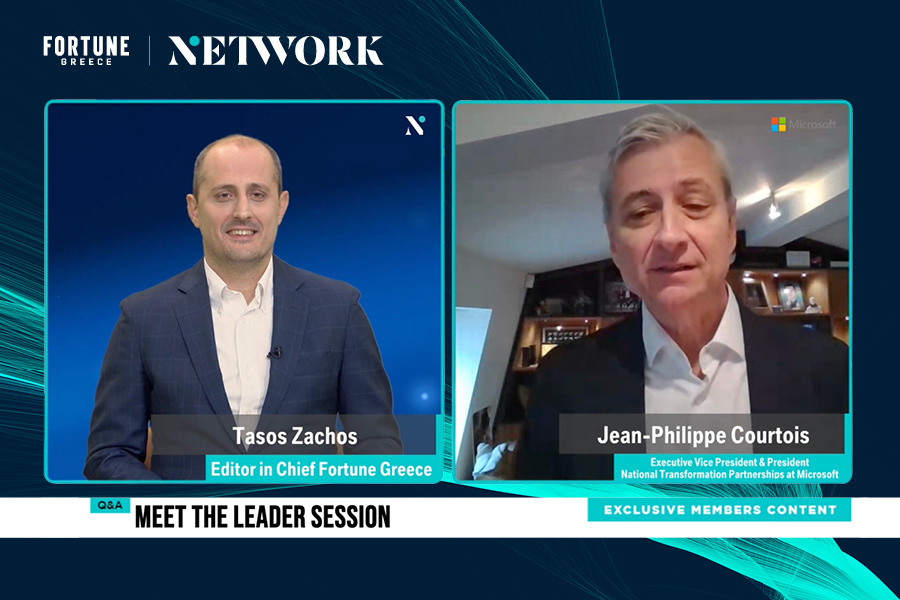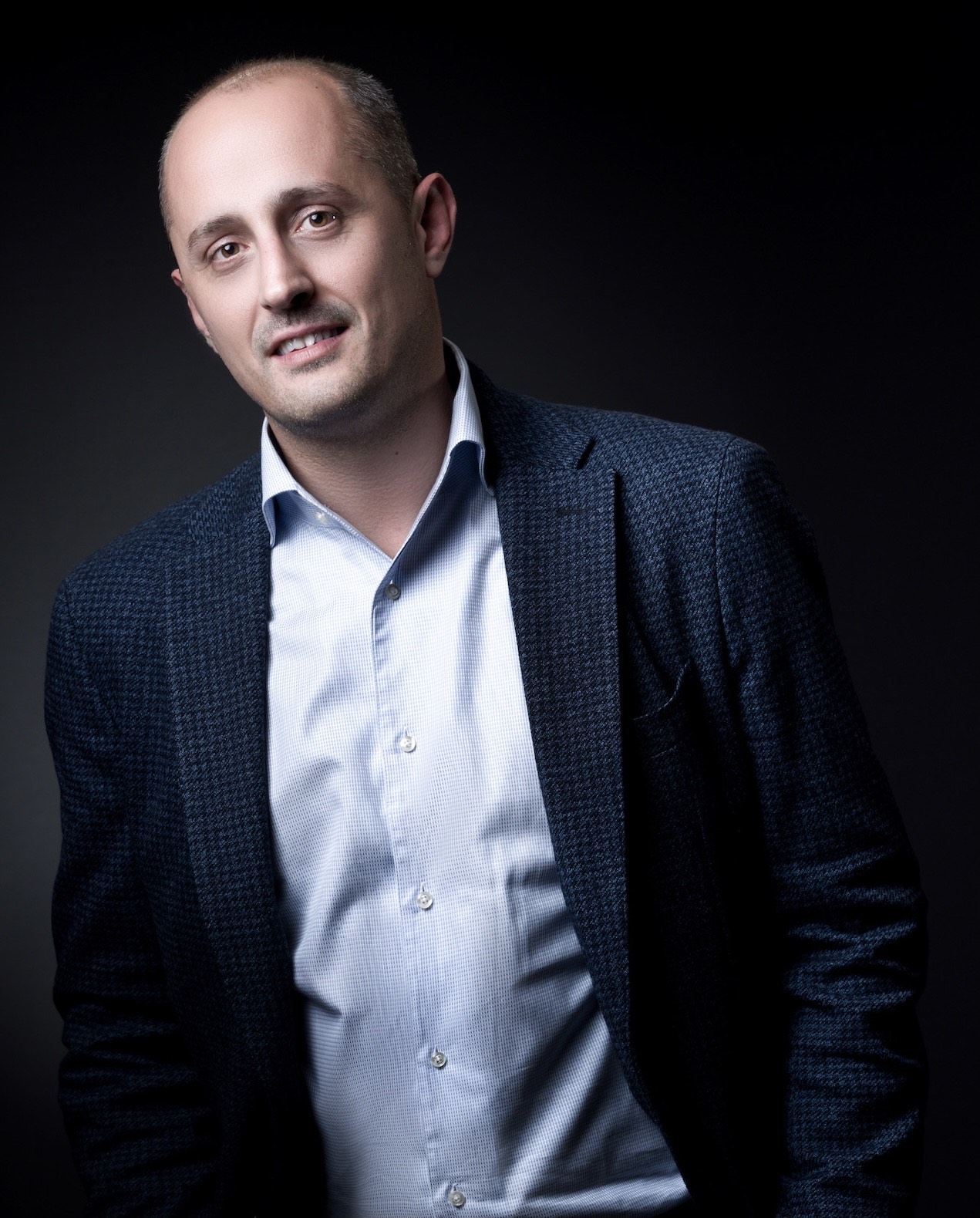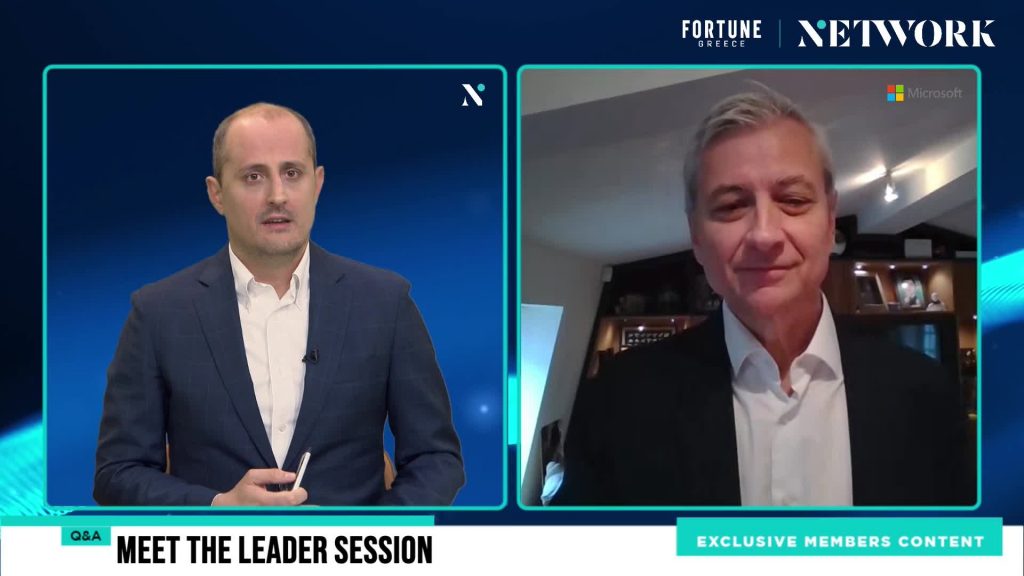Jean Philippe Courtois (Microsoft): Greece’s digital leap in the next ten years will surpass what has been achieved in four decades
- 09/03/2022, 10:53
- SHARE

A special guest, a corporate “legend” for Microsoft, Jean-Philippe Courtois spoke on Friday 4 March exclusively on the Fortune Greece Network platform.
It was our second meeting, this time online, after his visit to our country in November on the occasion of the digital revival of Ancient Olympia through artificial intelligence, the result of the collaboration between the Ministry of Culture and Sports and Microsoft Corp.
Jean-Philippe, or JP for his friends, with a presence at Microsoft since 1984, has led the technology giant’s commercial activities in more than 100 countries as Vice President and also as President of Sales and Marketing. In fact, one of his first assignments at Microsoft was to launch its operations in Greece, signing the first contract with a Greek company. Now as Executive Vice President & President, National Transformation Partnerships at Microsoft, he focuses on the digital transformation of countries and major partnerships with companies, such as the one with PPC and Piraeus Bank, signed in November.
Jean-Philippe is also passionate about promoting the concept of Positive Leadership. Outside of Microsoft, he devotes much of his time to the Live for Good Foundation, which he founded with his family in 2015. The foundation aims to unlock the potential of young people from all walks of life through social entrepreneurship, promoting purpose-driven social innovation.
We picked out and present for you some highlights from our conversation:
On the Greek scale up in technology:
“In my last visit, I met with the Ministry of Digital Governance in Greece. I was actually really inspired by the incredible work done in just the last couple of years to really help the population with the vaccine platform on the cloud, to really provide a number of government services for citizens at a time of stress. I also devoted to meet with and witness MoC signatures with Piraeus Bank and PPC. And I will not forget, of course, my physical and virtual visits of the Ancient Olympia exhibition with HoloLens. And of course, I had a great conversation with you, Tassos. Clearly, digital transformation is happening at a fast pace in Greece. And digital technology today can really enable small businesses in Greece all the way to large companies to truly increase productivity, to build more efficiencies and to modernize the way that the economies will evolve. I can tell you for sure that over the next ten years I think we’re going to see a lot more than what happened over the past 40 years when it comes to digital transformation”.
The need for upskilling and reskilling – The role of big corporations.
“This is a big need across the world. Two years ago, we decided to launch Global Skills Initiative, through which more than 48 million people have been trained. The Global Skill Initiative consists of forming unique partnerships with the public sector, with businesses, with employment agencies and staffing companies to really enable upskilling and reskilling and strengthen employment. So when it comes to Greece, we have the opportunity to partner again with the government to reskill and certify 3,000 civil servants in the government. And this is happening right now as we talk. We’ve been also forming an initiative called the Regeneration Initiative to go and help really underserved communities and thousands of unemployed people to go and find jobs. And I’m super excited to see that in Greece, we have a very clear path to achieve a lot more of that, while a lot more talent, Greek talents are coming back to the country now that they see more growth happening in the country”.
Microsoft’s new mission and mindful companies
“Back in 2014, when Satya Nadella became CEO of Microsoft, he defined with the senior team where I belong to, the new mission. The new mission was to empower every person to achieve more. What do those words mean really? They mean that we see technology as a means, not as an end. We see technology as an enabling and development factor for people’s capabilities and organizational capabilities. When you think about some of the biggest technology trends happening in the world, we see technology going from 5% of global GDP to account for 10% of global GDP over the next ten years by 2030. So it’s huge growth in terms of impact. And by the same token, we see any company on the planet from the smallest to largest, becoming digital businesses. In Microsoft, we think about the unique role that each one of us can play in helping transform the citizen, that school teacher, the entrepreneur, the civil servant or the organization to achieve more in what is more precious to their lives and their business”.
“The mindful or responsible companies are those companies that really understand that they don’t have a God-given right to do things. That’s actually a quote from our CEO. There’s no God-given right to do things everywhere in the world. You need to earn the respect and eventually the license to operate, to do things in the countries, the communities where you work as a company. And to me, that’s the beginning of understanding the role that a company should have in the world. Now, having said that, what does it mean as an example for a company at Microsoft? We start with the purpose that we discussed in the mission of the company and then we really look at our core capabilities, our core units, technology, innovation, our people, employees, our ecosystem of expertise. And we think about the unique areas where we can enable an inclusive and also sustainable economic growth in the world”.
Microsoft, the Russian invasion in Ukraine, and leadership
“In such horrible times that we go through to Europe with the Ukraine situation, we can talk very concretely about the example of cybersecurity, where as a company, we decided a few weeks back to really lean in and support the Ukrainian government and NATO to basically fight on all the cybersecurity attacks they were suffering. Microsoft’s cybersecurity team helped respond to cyber-attacks targeting more than 20 Ukrainian government, IT and financial sector organisations. We’ve been able to actually prevent some new malware that was coming obviously from Russia to get into the countries and to destroy their systems and all the core capabilities of the countries. So that’s one example among a few others that we have in mind as a company to play a role in society as well, when democracy is actually at stake”.
Tasos Zachos: Let me comment that Putin’s decision to invade to Ukraine is not a mindful decision. And you speak a lot about positive leadership. I also think this is an example of negative leadership in that case, because now we have a world at war. What is positive leadership for you?
“I have been inspired by what is called positive leadership. What is it? It is a leadership philosophy that has been created across three disciplines coming together, positive psychology, neurosciences and mindfulness. And what does the three, I would say, disciplines bring together is the following: At the highest level, it’s about really connecting your personal mission you have in yourself, your own purpose. We talk about company purpose, but each one of us hopefully has a purpose in his or her life. Not easy to define what it is. I know that for a fact because I’ve been struggling myself redefining it during my life. But it’s super important to have that clarity about why you are here as a human being in whatever you decide to do in your life – professional life, personal life, social life – and then connect that personal mission to a bigger mission you may want to belong to. And that bigger mission could be the role you play within your company. I talked a lot about the purpose of Microsoft and our employees. It will also be the work you do with your community, with your family, with an NGO, with philanthropy, to really help out with some of the biggest problems in the world. Even if you’re a small part, you do something positive about the world”.
On the phenomenon of the “Great Resignation”
“Actually, as you know, in the US, there’s been this Great Resignation, this reshuffle. It happens in some other countries. And there was a very interesting data point in one of the surveys coming from Edelman, which is the Trust Barometer. And in that barometer, one of the highest numbers ever emerged, which says that 61% of people employees who are quitting the jobs they have, they are quitting the job because they are not aligned with the beliefs and the values of their companies. So, it really means that there’s a big increase of people’s consciousness about the precious times we have in our lives and that people don’t want to accept any more living working places that don’t respect basically their core values. And that’s a big trend. I think we’re going to see it growing, developing, which shows you that the sense of purpose of ethics and the moral values of a company, actually, is super critical to keep attracting talents, to retain them, and to truly get the best of everyone into whatever you want to achieve”.
* To watch the full speech of Jean Philippe Courtois, apply to Fortune Greece Network!

